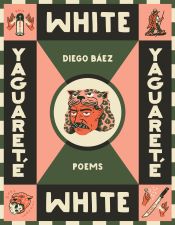Known as the first Paraguayan American poet to publish in the United States, Báez’s poem’s are written in English, Spanish, and Gaurani, the indigenous language of Paraguay. As for why he decided to incorporate all three languages into his debut collection, he explained, “It took me awhile to become comfortable writing in anything other than English… I do recall quite well, a senior seminar course during undergraduate at Illinois Wesleyan, I started to experiment with mixing some Spanish words and phrases into memory poems about Paraguay, and it felt natural, it felt comfortable, but it wasn’t until I spent a lot more time just really… visually looking at Guarani. It’s an interesting language visually because there’s these compounds of consonants and all kinds of diacritics that we don’t have certainly in English and not even in Spanish, and from that place of curiosity I wanted to learn more about well, how are these words working and how do they correspond with whatever minimal language I do have at my own disposal.”

I have such positive associations with those languages, right? Like, this book doesn’t get written without that background – the ambient Spanish, the ambient Guarani.”


What happens is that your wretched memory remembers the words and forgets what’s behind them.”

Podcast: Play in new window | Download
Subscribe: RSS

Want to join the discussion?
Feel free to contribute!